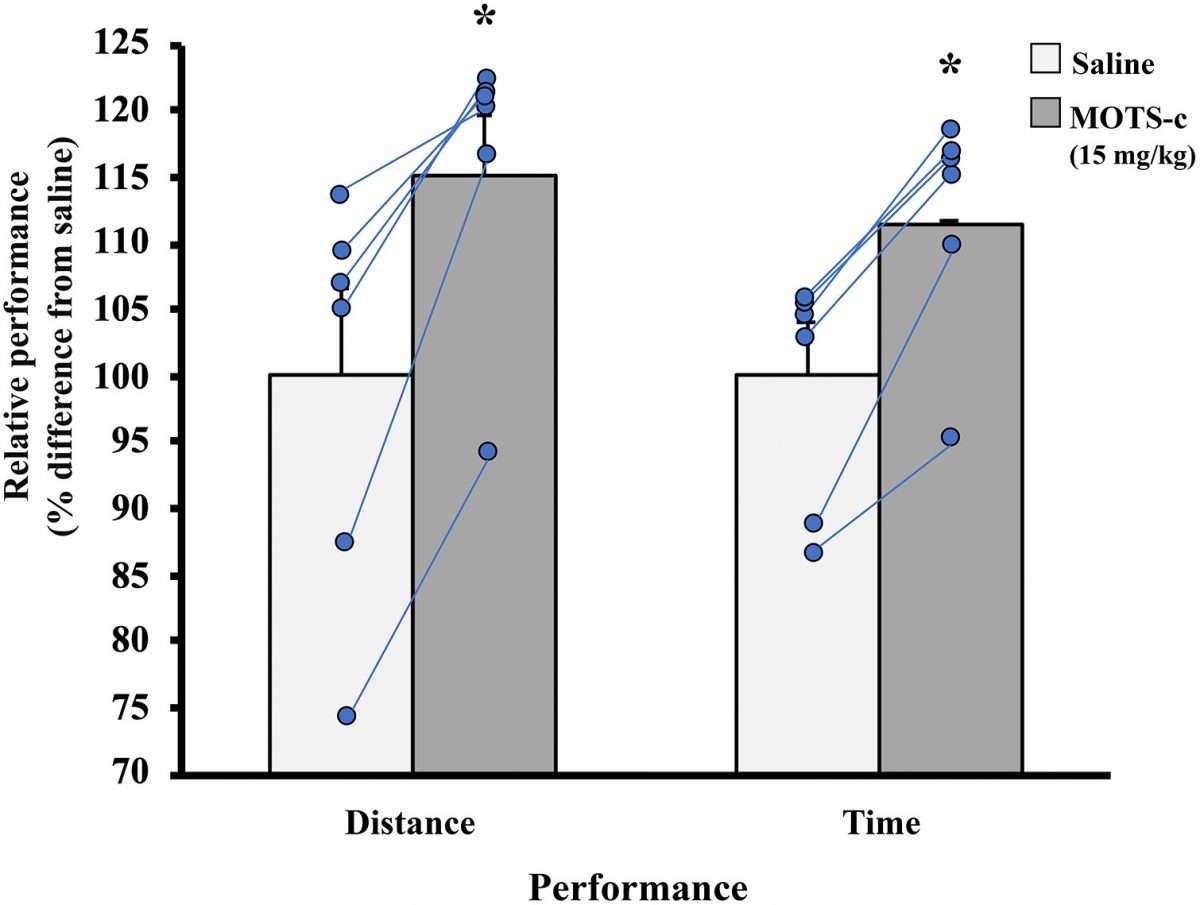While it’s widely known that exercise plays a crucial role in increasing our health and physical performance, what if we can take a drug that can even further enhance training efficiency?
MOTS-c is an emerging peptide under investigation as an experimental drug that is “stirring up” the potential of legitimately and significantly increasing exercise performance.
Is this drug too good to be true? Read on to find out more about MOTS-c peptide supplements.
RELATED: Everything You Need to Know About MOTS-c Mitochondrial Derived Peptide
MOTS-c Peptide Supplements: An “Exercise Pill” to Increase Performance
What Is MOTS-c Peptide?
Mitochondria: The Cell’s Powerhouses
Mitochondria – the power “factories” of the cells – are so crucial that they’re involved in many aspects of our health, from energy production and exercise performance to longevity.
The mitochondria supply our body with most of the energy it needs. They create approximately 90% of cellular energy. Without these organelles, the body would be deprived of most of its power, possibly leading to a total “collapse.”
MOTS-c as a Mitochondrial-derived Peptide
Our body makes peptides, the “building blocks” of proteins. Each peptide has a different function in our body. For example, some may help with weight loss and muscle growth; others may be useful in regenerating the biological structures of our body.
The MOTS-c is a newly identified peptide made by the mitochondria. It consists of a string of 16 amino acids expressed by a mitochondrial gene. These peptides are abundant in the cells that require more energy and possess more mitochondria, such as the muscle cells.
Because of its nature as a mitochondrial-derived peptide, the MOTS-c is closely related to energy metabolism, resulting in a hypothesis that supplementing this peptide may help humans increase muscle strength and exercise performance.
RELATED: How to Increase Mitochondrial Biogenesis to Improve Mitochondrial Health
How Does MOTS-c Peptide Work?
MOTS-c Peptide Enhances Glucose Metabolism

MOTS-c has been shown to have the capacity to enhance glucose metabolism. According to research, MOTS-c enhances the chemical processes that turn glucose into usable energy by increasing insulin sensitivity, energy expenditure, and heat production.
Insulin is the hormone the body releases to reduce glucose levels in the bloodstream. Insulin can do this by allowing blood glucose to move into the cells and be converted into energy. Consequently, by enhancing insulin sensitivity, the MOTS-c peptide allows the body to create and use more power, increasing energy expenditure.
On the other hand, heat production, or thermogenesis, is the process the body uses to increase its core temperature and warm itself. But where does the body get the “resources” to create the heat? It’s glucose – the natural energy resource of the body. So MOTS-c once again “revs up” glucose metabolism by burning more glucose for heat.
Research also shows that MOTS-c improves glucose metabolism and regulates glucose homeostasis by initiating glucose clearance rather than causing the liver to reduce glucose production. Indeed, MOTS-c treatment significantly reduced non-fasting glucose levels and improved response in glucose tolerance tests.
MOTS-c Peptide Increases Tolerance to Exercise
As clear as day, our muscles require massive energy during high-intensity exercise. But, if the workout persists, the muscle can be put under stress and end up being overloaded, even in the presence of sufficient energy supply.
Research shows MOTS-c can mediate exercise-induced mitohormesis, a biological response in which less stress on the mitochondria leads to increased health. This mediation subsequently stimulates physiological adaptation and exercise tolerance.
MOTS-c can also activate AMPK, an exercise “regulator.” AMPK, in particular, is a fuel-sensing enzyme in our cells. It is activated during exercise to further “fuel” the muscles with extra power supply by utilizing the stored energy.
RELATED: Peptide Therapy for Muscle Growth – Looking at CJC-1295, Ipamorelin, and Tesamorelin
MOTS-c Peptide Benefits in Exercise
MOTS-c Peptide Increases Running Time and Distance
To further elucidate the benefits of MOTS-c on exercise performance, scientists conducted a study on mice, in which the animal subjects were administered MOTS-c peptide supplements.
The study showed that only a single dose of MOTS-c peptide supplements (15 mg/kg) allowed the subjects to run longer and farther than those on saline.
In particular, 10 minutes before a 40-minute exercise challenge at a speed of 18 m/min, mice received either 0.9% saline or MOTS-c. The total distance and running time were the measurements used to evaluate performance.
After saline injection, no mouse reached the 40-minute threshold, but 5 of 6 mice did after MOTS-c supplementation. Only one mouse failed the challenge in either condition. Still, it exercised for 3 minutes longer after receiving MOTS-c than it did in the saline condition.
Statistically, MOTS-c supplementation improved performance in young adult mice by 12% and 15% of total time and exercise distance.

MOTS-c Peptide Benefits in Other Research
Although this is only a mouse study, scientists look forward to translating the benefits of MOTS-c peptide supplements on exercise performance into humans. This study is not the first to investigate the benefits of MOTS-c supplementation.
Consistently, a previous study on young (2-month-old), middle-aged (12-month-old), and old (22-month-old) mice also found that MOTS-c supplementation improved physical performance. In addition, these mice could also run a greater distance and time on a treadmill after administration of MOTS-c.
Surprisingly, three times a week of MOTS-c peptide supplements also increased physical capacity and health span in late-life (23.5 month-old) mice, suggesting that MOTS-c may play a role in regulating age-dependent physical decline and longevity.
RELATED: How to Increase Focus, Energy, and Performance
MOTS-c Peptide Effects Are Exercise-induced
Endogenous MOTS-c Levels Only Increase Upon Exercise

The same study above showed that MOTS-c levels in the muscles of the animal subjects only increased in those trained on a running wheel.
Those mice that trained within the most extended period (8 weeks) were able to run the longest distance (560 km) and had heavier muscle mass while also expressing the highest levels of MOTS-c (>2-fold compared to those without training).
The study also found that long-term exercise may be more effective in increasing endogenous MOTS-c than short-term exercise. Also, MOTS-c peptide supplements may work better with sustained physical training.
Effects May Return to Basal Levels if Training Ceases
The study also showed that MOTS-c levels remained higher after six weeks in mice that stopped exercising compared to those that never trained. After that, MOTS-c peptide levels in the muscle may significantly decrease, especially during a fasting period.
The higher levels of MOTS-c detected after six weeks in mice that stopped training suggest that either the expanded mitochondria continue to express MOTS-c or that MOTS-c accumulates within the cell and is slowly turned over.
Such elevation of MOTS-c reflects a long-term effect of exercise training and a potential benefit in modulating glucose metabolism and insulin sensitivity during inactivity following exercise.
MOTS-c Peptide Side Effects
MOTS-c peptide supplements have been shown to exhibit minimal side effects.
According to research, since MOTS-c primarily acts as an AMPK activator, as explained previously, its side effects may overlap with those of metformin, which also activates AMPK. However, it’s worth noting that the primary site of action for MOTS-c is the muscle. In contrast, metformin’s site of action is the liver.
In conclusion, the MOTS-c peptide can be a powerful supplement to enhance exercise performance. This peptide, by its actions on glucose metabolism, energy supply, and exercise tolerance, increases running time and distance in animals.
More research is needed until we can confirm that this peptide can be an “exercise pill” to increase human performance.
Yunique Medical provides FUNCTIONAL MEDICINE for optimized health and performance. We offer customized, scientifically advanced treatments to create a new state of human thriving. Why be ordinary when you can be optimal?
HUMAN 2.0 begins here!
Contact us to schedule your FREE consultation at one of our three locations in Florida – Ocala, Fruitland Park (The Villages), and Daytona.
UP NEXT:

